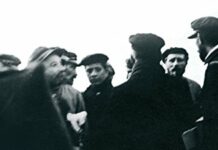
Ebook Info
- Published: 2011
- Number of pages: 859 pages
- Format: PDF
- File Size: 6.83 MB
- Authors: Robert Service
Description
Lenin is a colossal figure whose influence on twentieth-century history cannot be underestimated. Robert Service has written a calmly authoritative biography on this seemingly unknowable figure. Making use of recently opened archives, he has been able to piece together the private as well as the public life, giving the first complete picture of Lenin. This biography simultaneously provides an account of one of the greatest turning points in modern history. Through the prism of Lenin’s career, Service examines events such as the October Revolution and the ideas of Marxism-Leninism, the one-party state, economic modernisation, dictatorship, and the politics of inter-war Europe. In discovering the origins of the USSR, he casts light on the nature of the state and society which Lenin left behind and which have not entirely disappeared after the collapse of the Soviet regime in 1991. ‘Immensely scholarly but also vivid and readable. This is a splendid book, much the best that I have ever read about Lenin …I was overwhelmed by the power and vividness of this portrait.’ Dominic Lieven, Sunday Telegraph ‘He has managed skilfully to depict the surreal life of an obsessive, brilliant and stubborn individual’ Guardian ‘Lenin’s life was politics, but Service has succeeded in keeping Lenin the man in focus throughout . . . This book deserves a place among the best studies of one of the most fascinating figures in modern history’ Harold Shukman, The Times
User’s Reviews
Reviews from Amazon users which were colected at the time this book was published on the website:
⭐As a graduate student in sociology who studied the works of Karl Marx, I was always struck by the cruel irony that the only countries advancing his communist theories were exactly those places in which he least expected such revolutionary change; czarist Russia and feudal China. Marx had predicted that the western democracies, including England, France, and Germany, were the most likely locale for such proletariat uprisings. The fact that the two backward and predominantly rural countries of China and Russia were the only ones to succumb to the siren call of a worker’s paradise owes much to the unique and extraordinary efforts of exceptional individuals in each of the two countries, each of whom through their own extraordinary insight, political savvy and exquisite timing successfully executed bloody overthrows of ancient regimes.This wonderfully written and masterfully told biography of the first of these two men on horseback, Russian Vladimir Ilyich Ulyanov (Lenin) does great tribute to both the incredible genius and singularity of the man himself, while at the same time paints a wonderfully descriptive and quite comprehensive picture of the maelstrom of social, economic, and political circumstances surrounding the rise of Lenin’s Bolshevik party to power. Lenin’s importance in the subsequent developments both within the former Soviet Union and indeed throughout the modern world can hardly be exaggerated. And while we now self-confidently brag that the specter of communism is dead, the fact is that much of what Marx and later Lenin wrote regarding the continuing evolution of society continues to unfold.In what is commonly referred to as Marx’s “Emiseration” theory, the gradual but inexorable drift of the two major political forces, the proletariat and the bourgeoisie, toward increasing polarization and the eventual erosion of the large middle class separating them would lead to increasing concentration of wealth and widespread impoverishment as the owners of industry and corporations became more and more powerful and less and less accountable. Many observing the contemporary creation of a permanent “underclass” in modern democratic societies in the United States, Great Britain, and Germany as well as the slide of many in the middle class toward economic uncertainty and insecurity remember Marx’s prognostications nervously. Perhaps, they say, we have celebrated the final victory over communism too soon.In this fashion, Service’s wonderful book about Lenin and his ideas provides the reader with a terrific understanding of his biographical roots, his philosophical concerns, and his social, economic, and political agenda. Whether one gives any credence to Marxian thought or to Lenin’s revisions to this theory of scientific socialism, one must give credit to the quality of mind that conceived of such a mind-boggling overthrow of the powers that be, with little to work with but a rag-tag bunch of political malcontents and committed party members to work with. The story of how they actually succeeded at overthrowing one of the most callous and brutal regimes in modern history with so little going for them but the indifference of the populace and the blind ignorance of the existing monarchy is truly one for the history books. While that story is brilliantly told in John Reed’s spellbinding “Ten Days That Shook The World”, this biography shows how Lenin himself came to be the mastermind guiding the Bolsheviks toward victory and then through a bloody civil war to come to rule the country with an iron fist. This is a marvelously entertaining and edifying book, and is one I heartily recommend. Enjoy!
⭐This biography is different from the ones usually available: the author has delved deeply into the archives in Russia which have never been open before and he gives a balanced portrait of the man Lenin, as neutral as possible, always emphasizing the Russian background. By placing Lenin firmly into his own time, he does justice to a man who was driven by his convictions and who was one of the people who put their stamp on the 20th Century.Having said that, the editorial work is very sloppy, to say the least: the “old believers” are mentioned with the statement that they protested against a church reform of the seventh century, and later they are mentioned as having been formed in the seventeenth century. The use of the German language is abysmal: for the the “Bahnhofsplatz” in Zurich, the book gives us “Hofbahnplatz”, and for the Hauptbahnhof in Munich we get “Hofbahn”. I do not suppose that the author speaks German as well as he obviously does Russian, but a decent editor would have noticed these glaring blunders. Still, this is an important book if you want to learn about the man Lenin and his convictions.
⭐if a book needed writing why revolutionaries don‘t make good leaders, this is as good as it gets. He knew what he opposed but once in power was unable to govern nor provide direction to others. One can only wonder where we‘d be today if he hadn‘t been allowed to step on that train
⭐As with any detailed political figure biography, this book is a bit dense, slow and boring sometimes. On the other hand, It wouldn’t be so informative if it wasn’t so dense.I highly recommend it to anyone who wants to know more about the life of someone who still today is highly mentioned. It’s good to get to know a bit about him and realize how a lot of people who talk about Lenin have no idea about what they’re saying.
⭐This biography is incredibly thorough, and is entirely fixated on Lenin. In fact, that would be my one complaint. The book was so thoroughly focused on Lenin (and I can appreciate how silly this must sound as the book was a biography of Lenin), that it missed properly characterizing what was going on in Russia. In certain sections the book did discuss what was taking place in Russia, but usually only within the very limited scope of how Lenin was responding to the problem. I felt the narrative on Lenin would have benefited from an expanded discussion of what was going on socially within Russia as Lenin came to power. This weakness of the book is perhaps exacerbated by the fact (something I did not know) that Lenin lived for 18 years outside of Russia as an adult man. As his ideology was developing he was fully outside of Russian culture. Lenin was an average ideologue, but he was an above-average politician. His works on political philosophy, as Service says, were barely above the standard of a college student. They were not insightful and were not worthy of prominent distinction. Lenin was a consummate politician who did believe in the essential goals of socialism. I believe he would have been disgusted at what Stalin did with the gulag system; however, Lenin was a pragmatist. He did not allow Stalin to rise to power on accident. Did he see Stalin as a balance against Trotski who Lenin may have feared would be more willing to compromise? The life of Lenin illustrates the core problem of socialism: it has never been embraced by people who did not prove to be brutally totalitarian and completely unwilling to allow individuality.
⭐For any lover of Russian history Lenin no matter what your feelings are on him as a person or on the revolution is of huge importance. Robert Service has a style that is easy to read but also very descriptive. Fascinating read.
⭐Excellently researched and excellently written book. This history of Lenin is a fascinating read and one that I felt I had to do after reading two thomes on Stalin. Sometimes a trifle dry when trying to assimilate the many twists and turns of the numerous groups and committees in the early days of The October Revolution, it is, nevertheless, a book well worth buying.
⭐In depth and knowledgeable book, highly recommend. An accurate look into his life, you don’t get that from other books
⭐A good read but nothing to getting really appreciate or get excited about!
⭐Good interesting biography. Book in condition described.
Keywords
Free Download Lenin: A Biography in PDF format
Lenin: A Biography PDF Free Download
Download Lenin: A Biography 2011 PDF Free
Lenin: A Biography 2011 PDF Free Download
Download Lenin: A Biography PDF
Free Download Ebook Lenin: A Biography





